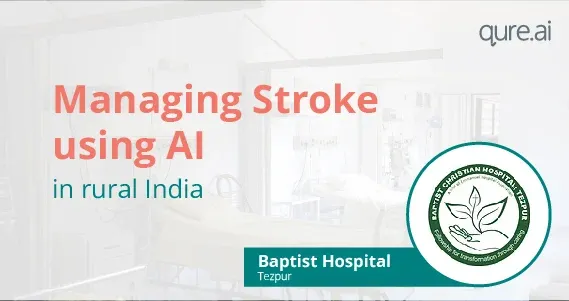One article by Dr. Justy Antony Chiramal MD, DTMH, focuses on the challenges and advancements in stroke and COVID-19 care in India and the UK, emphasizing the role of artificial intelligence (AI) in healthcare.
Back
In rural Assam, India, a 45-year-old tea plantation worker suffered a stroke but faced delays in treatment due to remote healthcare facilities and lack of specialists. This case exemplifies the plight of many in low-and-middle-income countries, where stroke cases have doubled in the past decade due to high prevalence of risk factors like hypertension and tobacco use. In India, with a population of 1.4 billion, there are only about 2,500 neurologists and 10,000 radiologists, leading to delays in diagnosis and treatment of strokes.
To address these issues, the Baptist Christian Hospital (BCH) in Tezpur, Assam, adopted Qure.ai’s AI technology, qER, for rapid interpretation of head CT scans. This FDA-approved technology detects various brain conditions, including strokes, and significantly reduces reporting time from over an hour to less than five minutes. This advancement aids non-specialist clinicians in rural areas, empowering them to make faster, more accurate decisions in emergency situations.
The article also discusses the impact of COVID-19, particularly how it overwhelmed healthcare systems worldwide. It mentions the use of AI in managing the pandemic, specifically highlighting the Royal Bolton Hospital in the UK, which used Qure.ai’s qXR for automated chest X-ray analysis. This technology helped monitor the progression of COVID-19 in patients, proving vital in the rapid assessment and triage of cases. qXR’s quick feedback and high accuracy relieved the burden on medical staff and increased efficiency in patient management during the pandemic’s peak.
Qure.ai’s solutions are noted for their compliance with EU-GDPR and ISO/IEC 27001, ensuring data privacy and security. The use of AI in medical imaging is further supported by Qure’s infrastructure on AWS, which offers scalability, security, and reliability.
In summary, the article highlights the critical role of AI in transforming healthcare, particularly in stroke care and COVID-19 management. It underscores the challenges faced by healthcare systems in resource-limited settings and illustrates how technology, like that offered by Qure.ai, can bridge the gap, improve patient outcomes, and support medical professionals in their decision-making processes.
